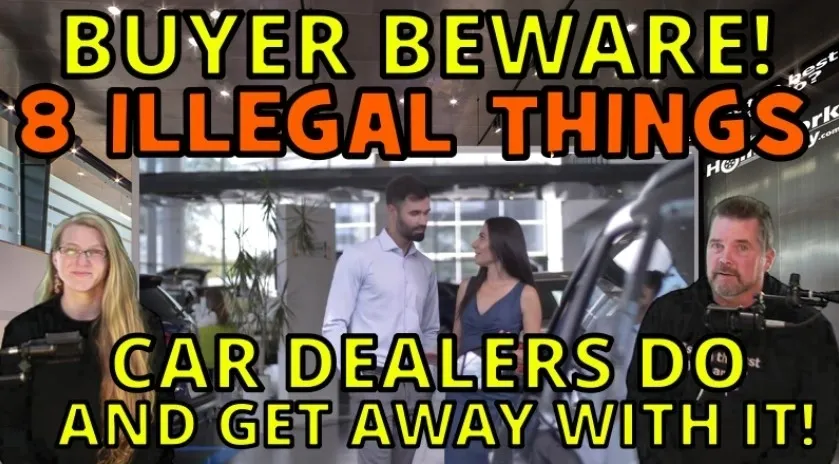8 Illegal things Car Dealers Do

8 illegal things Car Dealers do
Number 1. Bait & Switch price Advertising, and Advertising Misrepresentations. In general, Dealerships use the bait and switch advertising scam in order to get customers into the car dealership by advertising a low price or low payments on a particular vehicle. Here’s another one. It pertains to the Offering Price, and the FTC explains that “Offering Price” of a vehicle means “the full cash price for which a dealer will sell or finance the motor vehicle to any consumer,” excluding only required government charges.”
Number 2: Games with your written OTD pricing request. The law says that if a consumer requests an OTD Price in writing, the dealer MUST respond ALSO in writing. That means they have no choice in the matter. They can’t call you or email you back to say “Just come in!”
Number 3 Forced Add-ons. Many Dealers use Unlawful Practices Relating to Add-Ons A direct quote from the FTC says “Another key consumer protection concern is the sale of “add-on” products and services in a deceptive or unfair manner. Commonly offered add-ons include extended warranties, service and maintenance plans, payment programs, “GAP insurance”, emergency road service, VIN etching and other theft protection devices, and undercoating. “It’s not optional they say, but mandatory.”
Number 4. Keeping Your Cash Deposit on a vehicle.
Dealers are prohibited from keeping your cash deposit when you’ve made a decision that you do not wish to engage in a transaction with them.
Number 5. Charging Junk Fees. Junk Fees are perhaps one of the most popular categories of abuse by dealers. We have a list of Fake Fees on our website, but Dealers never stop inventing more! Most are a hoax. If you’re wondering what exactly is a junk fee, it’s any fee the dealer charges a car buyer that is taxable. To look at it another way, the ONLY fees that are NOT taxed are the title transfer and the license fees collected by the dealer but go directly to the state. Those are the only fees that are NOT Junk Fees.
Number 6. Paperwork Falsification. Falsifying paperwork to get a loan approval, or forging customer signatures on documents is just fraud. One way to make sure you weren’t a victim of falsified signatures is to take a copy of every document with you that you sign in dealer finance, and then contact your lender to ask for the car contract copy that they funded the loan with. When the two don’t match up, you need to contact a consumer protection attorney in your state immediately and file a lawsuit against the dealer. Don’t worry about attorney fees, because the dealer will be court ordered to pay them.
Number 7. Misrepresentations regarding financial terms. Consumer complaints have included offers by the dealer pertaining to either a purchase or a lease. When a dealer improperly discloses the financial terms or misstates the interest rate, the dealer has violated the Truth in Lending Act. This would give rise to claims for statutory damages, actual damages, and the dealer would have to pay your attorney fees and court costs. Some dealers have also lured potential buyers through financial incentives that are incidental to the purchase, such the promise of a valuable prize. Friends, if there’s a prize involved, never visit that dealer. NEVER! Only a scammer does that!
Number 8. Failure to pay off a lien. The situation is common, sadly. The dealer takes your car in on trade, but it still has a loan on it. Right? They say “We’ll pay it off for you,” but what happens when they don’t? And yes, you’d have legal recourse against the dealer, but unfortunately, you’d be financially hurt in the meantime because you are still responsible for making the payments.



